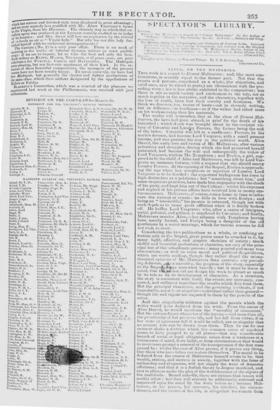THE VOCAL CONCERTS.
Tim fifth concert, on Monday evening, presented the following scheme.
1. Overture, Le Ruene di Paluzzi A. lkimassa. 2. Cantata, Job B. Kt.t IN.
3. Glee, " Blow, blow, thim winter wind" Sri vs ss.
4. Aria, Miss II .wEs," Del mio core" 11AV DN. 5. .Ma.lrigal. "Sister awake " RATF, ON. 6. Selection from The Season, 11AVI,N.
B. Air, Mrs. A. SH %V,"Virgin holy "
\Velma.
7. Concertino Vio L
lin. Mr. IlAoltovE
9. Selection M Oberon
10. Madrigal," Sigh not, fond shepherd " Felt :tern.
11. 0 "0 the sweet contentment " 12. Chorus "1 he ti,n.ir couches" (The Maniac) unitise.
The Vocal Concerts of this season have assumed a different ch.
raeter from those of former years ; the selections having been less mit- cellaneous, and consisting more of entire works, or large portions of them, than heretofore. The principal features of this concert, for example, were" The Autumn" from HAYDN'S Seasons, and selections from WEBER'S Oberon. Whether the curtailment of the number of glees, and other compositions of the English school, and the substitu. lion of those of the foreign masters, tire politic, may be glestioned; but where the choice is between excellence of different kinds, in tliffe- mice of tastes in successive managers will provoke no censure from us. In both classes of nntsic the Vocal Colleens have the ground to themselves : at no other could we hear the works of HAYDN and WEBER, or similar ones any more than the Anthems, Madrigals, Glees, and Dramatic music of the English school; for we cannot dig- nify the perpetration of a Madrigal at the Ancient Concerts with the name of a performance, or one of Mr. Kevverr's trashy harmonized airs with the title of a Glee.
The Seasons is a work which is rarely beard in this country;
although its subject is more congenial to the taste of its author, sad more within his grasp, than that of' the Creation. HAN ON is eminently Fracefol, pathetic, tender ; but the true sublime be never reaches. lie Is the GUIDO, not the MICUAEL ANGELO of his art. His orchestral combinations are masterly in the highest degree, and Iris power to call into action the descriptive agency of his orchestra unsurpassed. In The Seasons, all his peculiar excellences have a proper field for their exertion ; and the admixture of dramatic phrases with the most sub- lime of subjects, which offends in the Creation, hits there no occurrence. The composer's business is with nian—his feelings, his pursuits, his spurts ; where all HAYDN'S powers and modes of expression appear to their greatest advantage. "Into the heaven of heavens" he it unable to ascend. In the Creation he sought to ally himself to the in- spired volume and to MILTON but in the verse of 'THOMSON he fella a more equal associate. The music in *A. t 1" was quite wain the reach, and well suited to the
know how to apirreciute excel' es most creditably;
'sure to those wino and the entire selection im before we are gratified with another section of Ilathveunsee13.sEst.tf..tiss%csl.ilibre, nt,sf rare. We shall be doomed to sit out sco The selection from Oberon comprised the fairy-like Chorus with which the opera commences. The Finale to the first act, the beau- tiful air " A lovely Arab maid," mid the well-known Quartet; Ell bringing with them welcome reminiscenves of pleasure 'low denied, and of glory now departed. nightie], which nhly be called the native hold of Oberon, has disowned lice offspring, leaving it to be me tured and patronizsd in Germany. The selection NVA adiniiably performed.
Miss Hawes iutroduced a charming song from Havne's Oleo, ta
which her correct
nd and finished style were displayed to great advantage ;
owe were scarcely less gratified with Mt. JOHN THOMSON'S hymn to the Virgin, from his Hermann. The slovenly way in which that ex. allele opera was produced at the Lyceum scareely enabled us to judge ef its beauties: and Mrs. S.naw will lose no reputation by the revival of so lovely an air " Virgin holy." But why has not this lady fur. sidled herself with its orchestral accompamineets ? The Cantata (No. 2) is a very poor affair. There is no need of resorting to the works of inferior German writers (a most prolific crop) ; if we are to import, let Us take the best and only the best. Such writers as KLEIN, IIA Stilt, NEUKOMM, el id genus mane, are poor substitutes for PURCELL, Oitorr, and BATTISHILL. The Madrigals were pleasing, but not first-rate specimens of their kind. In the se- lection of these beautiful compositions, the teenagers of the present season have not been usually happy. To speak correctly, we have had few Madrigals, but generally the shorter and lighter productions of the same class, which their authors designated by the appellations of Ballets or Fal-las. BLAGROVE'S Concertino, which was a renewal of the pleasure we experienced last week at the Philharmonic, was received with just
enthusiasm.



























 Previous page
Previous page